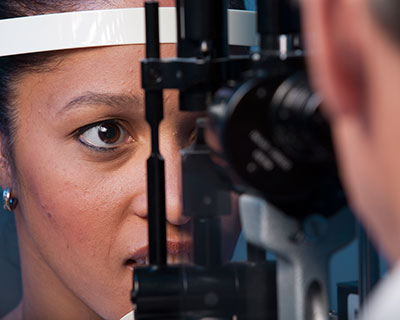What Is Plaquenil?
Plaquenil (Hydroxychloroquine sulfate) is a drug used to treat certain autoimmune diseases. This type of disease happens when the body's immune system attacks its own healthy tissue. Some diseases treated with Plaquenil are:
- Lupus, which causes fever, rashes, skin problems, and other symptoms.
- Rheumatoid arthritis, a condition that causes pain and swelling in the joints of your hands and feet.
- Sjögren’s syndrome, which causes dry eyes and dry mouth.
Plaquenil lowers your immune system’s ability to cause inflammation. This can help control symptoms like rashes, skin and mouth sores and joint pain.
Plaquenil and your eyes
A rare side effect of Plaquenil is damage to the eye's retina. The retina is the light-sensitive tissue at the back of the eye. Using Plaquenil for a long period of time may harm the retina, causing serious vision loss.
People with retinal damage from Plaquenil are not aware at first that they are losing vision. Unfortunately, vision loss from Plaquenil can be permanent. If you take Plaquenil, it is very important to see an ophthalmologist regularly. Your ophthalmologist will check your retina for problems before serious damage occurs.
Who is at risk for vision loss with Plaquenil?
Some people who take Plaquenil have a higher risk of retinal damage than others. They include:
- people taking Plaquenil for 5 or more years
- people taking Plaquenil at higher doses than recommended
- people who take other retina-toxic medications, such as tamoxifen
- people who already have retinal disease
- people who already have kidney or liver disease
- people over 60 years old
- people who lose a lot of weight while taking Plaquenil. Tell your doctor if this happens as your dose may need to be lowered.
When should you see an ophthalmologist when taking Plaquenil?
If you take Plaquenil, here is when to see an ophthalmologist:
- Within the first year of beginning Plaquenil, you should have a “baseline” eye exam. This measures the health of your eyes and looks for retinal or macular disease.
- Once a year while taking Plaquenil.
- After five years of Plaquenil treatment, for those on acceptable doses without major risk factors, see your ophthalmologist annually (once per year).
For those on acceptable doses with major risk factor(s) for retinal damage from Plaquenil, you may need to see your ophthalmologist more often. Special tests can help find early damage to the retina before serious problems develop.
How do ophthalmologists look for Plaquenil damage?
Your ophthalmologist may use these tests to look for retina damage from Plaquenil:
- Visual field test: During this test you sit down and look into a bowl-like machine. Small lights flash at different points inside the bowl. When you see the lights, you press a button. This test can help find if blind spots have developed in your field of vision.
- OCT imaging: This test makes a detailed, three-dimensional image of your eye. Your ophthalmologist can use this image to look for early retinal damage.
- Multifocal ERG looks at cells in the retina called rods and cones. The test measures how well these cells respond to light. It can find retinal damage from Plaquenil.
- Photos: A special camera takes pictures of the retina. Photos show damaged areas as small spots of light.

If you take Plaquenil, it is important to see an ophthalmologist while you take this medicine.
What happens if retinal damage is found?
If your ophthalmologist finds any signs of retinal damage, they will tell your primary care doctor or inflammatory disease specialist to stop Plaquenil treatment immediately. This will help you avoid central vision loss. Unfortunately, vision loss from Plaquenil is not reversible. So early detection of early retinal changes and stopping Plaquenil are the only steps that will protect your vision. This will help you avoid permanent vision loss. Your other doctor will find another treatment for your disease.